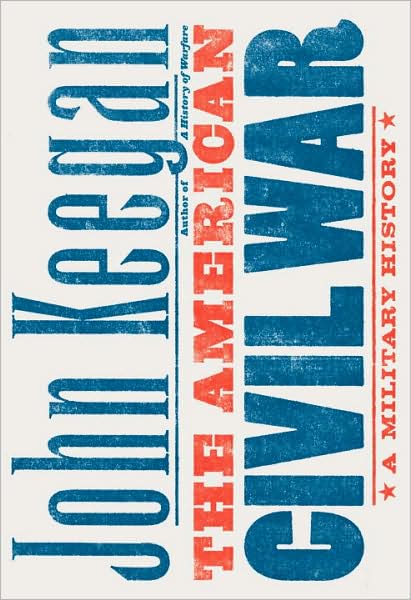 John Keegan writes brilliant military history books: The Face of Battle, The Mask of Command, Soldiers, and a dozen more. The books are clearly written and accessible to the average reader. Keegan’s latest book, The American Civil War brings his British objectivity to bear on our most disturbing and horrific war. Some readers will chafe while Keegan puts the economic, political, and social factors behind the Civil War into perspective for the first hundred pages. But then the analysis of the key battles begin and the surprises mount. Who knew so many Southerners fought without shoes? Who knew the South led the world in submarine technology? Keegan even brings in Karl Marx who predicted the South would lose because of the North’s economic power. In about 360 pages, Keegan manages to capture the essence of the Civil War in ways that made me reexamine familiar history and make it new again. I hope someone like James Reasoner, who has written extensively on the Civil War, comments on this volume. I thought it was magnificent! GRADE: A
John Keegan writes brilliant military history books: The Face of Battle, The Mask of Command, Soldiers, and a dozen more. The books are clearly written and accessible to the average reader. Keegan’s latest book, The American Civil War brings his British objectivity to bear on our most disturbing and horrific war. Some readers will chafe while Keegan puts the economic, political, and social factors behind the Civil War into perspective for the first hundred pages. But then the analysis of the key battles begin and the surprises mount. Who knew so many Southerners fought without shoes? Who knew the South led the world in submarine technology? Keegan even brings in Karl Marx who predicted the South would lose because of the North’s economic power. In about 360 pages, Keegan manages to capture the essence of the Civil War in ways that made me reexamine familiar history and make it new again. I hope someone like James Reasoner, who has written extensively on the Civil War, comments on this volume. I thought it was magnificent! GRADE: A


I read Keegan’s brief life of Winston Churchill a few years ago and he did a good job in the space allotted in the Penguin series. The Civil War has been one of my interests since I read THE DAY LINCOLN WAS SHOT by Jim Bishop when I was a lot younger.
I liked all the Keegan books I’ve read, Jeff. This new one on the Civil War brings the conflict into focus in ways that surprised me.
Nice he can do it so economically–page-wise.
Not a wasted word in THE AMERICAN CIVIL WAR, Patti. Keegan is a paragon of the economic use of prose. His perspectives on the conflict are unique.
How does this stack up to Bruce Catton’s three volume set?
THE AMERICAN CIVIL WAR is shorter and more analytical than Catton’s opus, Rick. In a word: terrific!
Jeff, my cousin and I memorized THE DAY LINCOLN WAS SHOT and wasted no chance to regurgitate as many facts as possible into every conversation.
Keegan doesn’t spend a lot of time on Lincoln’s assassination, Bob. But he does explore how Lincoln’s death led to misery for both the North and the South.
This is a bit more accessible than McPherson’s BATTLE CRY OF FREEDOM, and would make a pretty decent introduction for someone who knows little about the subject.
McPherson’s BATTLE CRY OF FREEDOM is a classic, Drongo. Some consider it the best one-volume history of the Civil War. But Keegan’s book has its charms, too.
I haven’t seen this one yet but will definitely look for it. Didn’t Keegan do a World War I book as well? I seem to remember being impressed by it. I don’t have any Civil War projects in the works at the moment, but I’m sure that one of these days . . .
Yes, James, Keegan wrote a book about World War I (and II). You’ve written some wonderful books on the Civil War so I’m curious what an expert thinks of Keegan’s perspective. I found it refreshing.